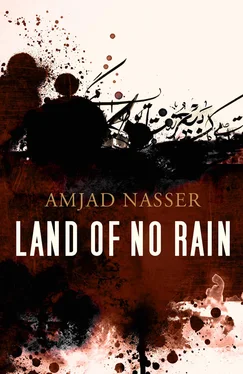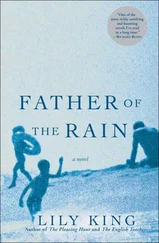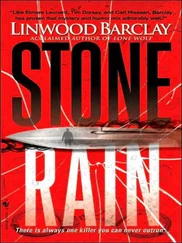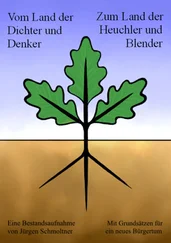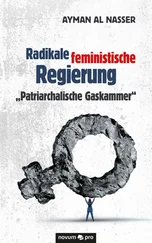The sun hung perpendicularly above the grave. An imperious sun that reminded him of the sun he had known here in the old days. He heard the flapping of wings. He looked towards the eastern edge of the cemetery and saw a bird of prey ready to swoop. Beyond the rickety wire fence a spiral of dust was rising into the bare sky and threatening to approach. He noticed that when he heard the flapping of the predator’s wings the boy looked in the same direction and saw the spiral of dust. ‘We should be going, Uncle,’ young Younis said. His uncle didn’t answer. He looked at the tombstone and reread the words, carved in black in thuluth style: Here Lies the Late. . He looked around the grave. There was no space. No room for another grave. There were graves side by side, without markers. No trees, just some withered weeds. Young Younis stepped towards the cemetery gate where the caretaker, his tattered scarf thrown around his neck, stood looking at them. I had a strong sense that the man who had come home was thinking about himself, about his name, or rather his two names. Which of them would be carved on his tombstone? He looked around, as if looking for someone he could not see but whose presence he sensed. His gaze settled on the east. He coughed violently and spat out blood, lots of blood.
The caretaker was still standing at the ready, his head protected by his scarf from a sun that was starting to grow fiercer. Young Younis had reached the gate. He saw him stop at the entrance. The caretaker went up to the boy and started to talk to him with his hands. As he came up to them young Younis said, ‘Uncle, give him something.’ The man who had come home automatically put his hand in his trouser pocket and found a large silver coin, which he handed to the caretaker. The caretaker examined the large silver coin. He turned it over in his hand and then gave it back, a look of disgust on his face. He withdrew his right hand sharply. The man who had come back looked at the coin the caretaker had returned. It had been struck to commemorate the silver jubilee of the Grandson’s accession.
Elias Khoury’s Introduction: The Split Ego and the Hollows of Time
In London, where I now live disguised as an imaginary person, on the run from my mother’s prophecy in which my original name rings as a terrifying memory (‘Yahya, your soul will never know rest,’ she said), it’s hard to lie on the sloping tile roof of one’s house and count the stars that have abandoned their positions.
With this passage Amjad Nasser ends the first poem in his latest collection, Life as a Disrupted Narrative . What’s fascinating in this collection is how deeply he explores the lyricism of narrative, in that the poetry takes shape from the colourings of life, mixed with legend, and from the capacity of the moment to be so condensed that it becomes a compression of time.
The aim of this introduction is not to analyse a book of poetry that holds a special place on the map of contemporary Arabic poetry. But Amjad Nasser was mistaken when he believed that the best person to introduce his first novel to the reader would be a novelist, because the secret that no one believes when I reveal it is that what fascinates me in literature is the ability of words to compress time. Only poetry does that. That’s why Scheherazade resorted to interlacing her magical stories with poetry, to reinforce the sense, as if the words of poetry are a nail we hammer into the wall of time. That’s why novelists since Cervantes have turned narration into successive poetical moments, so that the story can absorb the pulse of things and their secret whispers.
When I reread Life as a Disrupted Narrative , I realised that it was only a matter of time before Amjad Nasser came to the novel, because the poet who has filled the gaps in time with poems must come round to writing time. And time is deceptive and slow, however rapid its capricious changes may be. We only have to reread his poem A Young Woman in Costa Coffee to discover that the story we will read in this book started there, when the young woman walked out of the poem and sat down in front of the poet to tell us about ‘the poem that thought about another poem and then wrote it’.
When I began reading this book, I could smell the country that Amjad Nasser calls Hamiya. This smell has never left my skin since I went to Amman after the defeat of June 1967. The city is engraved in my memory by the term ‘white city’. Memory is deceptive and, as we shall see in this novel, is a product of, or another name for, the imagination, or its image in the mirror of time. But Amjad Nasser is not telling the story of Jordan, but is using the fragrance of memory to write a delightful and profound novel about the hollows of time and the lessons of a life dissipated in exile.
In this novel the reader may find a story about Arab governments and also about the way they are opposed, and this is correct, because the whole eastern part of the Arab world has seen an illusion transformed into political and social facts that have become entrenched. I exclude Egypt here because its recent history is different, though it has now come to resemble other Hamiyas in almost everything.
This reading is not mistaken, and it may be a necessary one, as part of reading the transformations in Arab consciousness and to understand the major changes that have led to a conceptual upheaval at a time when fundamentalist currents are in the ascendant.
But I am not inclined to that reading. The magic of this text lies in its ambiguities and what is unspoken, and in the dualism with which the text glows, turning the narrative into a sturdy structure that reaches completion through what is missing and indulges in a nostalgia that avoids the temptation of nostalgia, but drinks the bitterness of nostalgia to the point of drunkenness.
In the beginning I believed I was dealing with something that resembled a memoir, only to discover that what looked like a memoir was only a trick. The novel uses the approach of a fictional autobiography, told in the first person, but the hero, a writer and a poet, splits in half: Younis and Adham. Younis is his real name; Adham is the pseudonym with which he signs his writings. This split, which seems at first sight to be the incarnation of the writer’s real personality, rapidly vanishes when we discover other characters in the book and when we feel that the division of the ego is the structure of the novel, not its medium. The autobiographical approach has often been used in contemporary Arabic literature. Ghalib Halasa, who gave most of his heroes the name Ghalib, may have been the pioneer of this approach, but Amjad Nasser’s novel and Halasa’s story Sultana have something deeper in common than just this superficial approach. What unites them is the smell of place, the fragrance of memory that resists being dispersed by writing.
The narrative text begins at the first moment. Younis’s, or Adham’s, journey back to his homeland, after an absence of twenty years, forms the key to memory. We are dealing with a memory that reconstructs the past, not to recover it or mourn it, but as a mirror for the self. Younis stands in front of this mirror and finds someone else in front of him. And Roula is retrieved, not as an eternal love but as mother to the division that will afflict the narrator’s son. Younis, who married on the Island of the Sun after the great exodus from the City of Siege and War, will name his son Badr, after the great Iraqi poet that he loves, and when he comes back to Hamiya he will discover that Roula has given her first son the same name, at a moment when the relationships and the significances are ambiguous, in that we don’t know whether Younis is the father of the second Badr or whether the hero’s division into two people will continue through two sons who bear the same name.
Читать дальше
